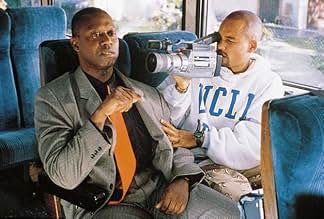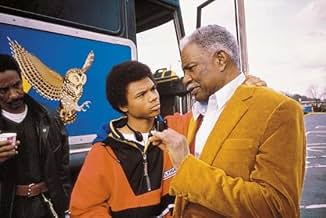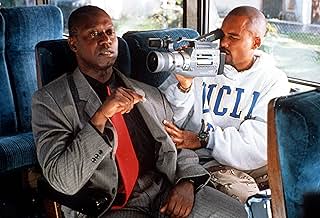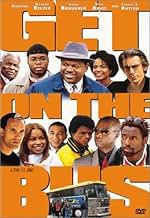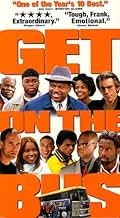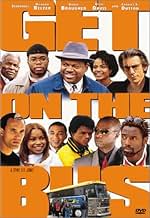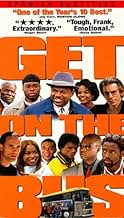Get on the Bus
NOTE IMDb
6,9/10
6,3 k
MA NOTE
Ajouter une intrigue dans votre langueA disparate group of African-American men travel by bus to Washington, DC for the Million Man March.A disparate group of African-American men travel by bus to Washington, DC for the Million Man March.A disparate group of African-American men travel by bus to Washington, DC for the Million Man March.
- Réalisation
- Scénario
- Casting principal
- Récompenses
- 2 victoires et 5 nominations au total
Kristen Wilson
- Shelly
- (as Kristin Wilson)
Avis à la une
Get on The Bus is all about dialogue. That is, a dialogue between one community of Americans, within the confines of a bus headed to the 1995 Million Man March. This is an emotional rollercoaster. None of the men in this film are of the same mindset, or from the same walk of life, but have come together for a common cause. Ossie Davis gives an all-time great performance. Overall, this is an under-appreciated Spike Lee joint. Perhaps it will find a new life in the times we are living in.
We join the bus ride with a group of Black Americans as they journey to the Million Man March. During this journey, the camera enters the soul and beliefs of each character that represents a whole spectrum of the Black community. Their conversations range from the politics to the religions and beyond their inner-self . Each one finding new meaning to their life and destiny. Reggie's preachy but fascinating script is handled masterfully by the genius Spike Lee.
I always intended to watch this movie for a long time but I kept putting it off. I was really surprised at how excellent and well-written this movie actually was. If you enjoy films where a group of diverse people are put into a situation and then left to deal with each other (eg "Twelve Angry Men"), then you must see this movie.
This film was also very intelligent. I think too many people believe that if you get a group of black men together for anything, they'll soon be calling each other "nigga" and violence will erupt, not necessarily in that order. About halfway through the movie, I told my wife that the n-word had not been used at all, and no punches had been thrown.
But I was wrong.
What made it even more interesting was the way the men responded to the person who called everyone "nigga," and there was a fight, which occurred between a homosexual and an arrogant, big-mouthed guy who kept calling him "faggot." I don't condone violence, but the gay guy knocked him down a peg or two, and he certainly had it coming.
This film also solidifies Andre Braugher as an incredible actor. He has taken on such diverse roles and here, he was outstanding. So many of these actors were. Almost every scenario and discussion is covered in two hours well spent.
This film was also very intelligent. I think too many people believe that if you get a group of black men together for anything, they'll soon be calling each other "nigga" and violence will erupt, not necessarily in that order. About halfway through the movie, I told my wife that the n-word had not been used at all, and no punches had been thrown.
But I was wrong.
What made it even more interesting was the way the men responded to the person who called everyone "nigga," and there was a fight, which occurred between a homosexual and an arrogant, big-mouthed guy who kept calling him "faggot." I don't condone violence, but the gay guy knocked him down a peg or two, and he certainly had it coming.
This film also solidifies Andre Braugher as an incredible actor. He has taken on such diverse roles and here, he was outstanding. So many of these actors were. Almost every scenario and discussion is covered in two hours well spent.
Armed with 16mm cameras, a miniscule budget financed independently by 15 different black businessmen, and a wonderful script, Spike shot "Get On The Bus" and released it to commemorate the one-year anniversary of the 1995 Million Man March. Set on a bus bound for Washington D.C., this film examines the problems and opinions of various of black men on racial issues in the 90's.
Family, misogyny, homosexuality, religion, violence, education, and economics are all addressed here as well as other issues. Spike does not only shed light on issues that pertain to black peoples involvement in White America, but the film also attacks color-consciousness among light-skinned and dark-skinned blacks (as he did in "School Daze"). Like "School Daze," this may be the only other Spike Lee film that seems to be aimed directly at Black America, and Spike shows the varying degrees of complexity with his cast of characters. There is a rage-filled actor, a homosexual couple in the midst of separating (one out-and-proud, the other closeted), a sensitive cop, a level-headed family man, a gangbanger turned Sunni Muslim, a naive filmmaker, and a tired, defeated elderly man. There is also an estranged father who sees the March as an opportunity to re-connect with his resentful, bound-for-crime teenage son. His son has been recently convicted of burglary and has been ordered to remain "chained" to his father for 48 hours, the irony of which does not escape the other members on the bus.
Given the film is almost set entirely on a bus, Spike restrains himself in dispensing out his evolving camera and editing styles, using only a brief sequence set in a desert to bleach the screen with a heavy yellow tint. Many Spike Lee regulars are in the film, like Ossie Davis and Isaiah Washington who give sound performances (Davis' "I lost everything" monologue is especially moving). The real notable acting is provided by Andre Braugher as an angry, egocentric actor whose rage is fortunately balanced for him with a healthy dose of articulated intelligence and Roger Guenever Smith as a sensitive, bi-racial cop who works in South Central Los Angeles. Those two really are the stand-outs in this film.
The dialogue is so flowing and casual in this film despite its topic matter, that you could listen to this film instead of watch it! I can't recommend this film enough for fans of Spike Lee or fans of great dialogue. As a Spike Lee worshipper, I rank this film in his top 5. Potent.
Family, misogyny, homosexuality, religion, violence, education, and economics are all addressed here as well as other issues. Spike does not only shed light on issues that pertain to black peoples involvement in White America, but the film also attacks color-consciousness among light-skinned and dark-skinned blacks (as he did in "School Daze"). Like "School Daze," this may be the only other Spike Lee film that seems to be aimed directly at Black America, and Spike shows the varying degrees of complexity with his cast of characters. There is a rage-filled actor, a homosexual couple in the midst of separating (one out-and-proud, the other closeted), a sensitive cop, a level-headed family man, a gangbanger turned Sunni Muslim, a naive filmmaker, and a tired, defeated elderly man. There is also an estranged father who sees the March as an opportunity to re-connect with his resentful, bound-for-crime teenage son. His son has been recently convicted of burglary and has been ordered to remain "chained" to his father for 48 hours, the irony of which does not escape the other members on the bus.
Given the film is almost set entirely on a bus, Spike restrains himself in dispensing out his evolving camera and editing styles, using only a brief sequence set in a desert to bleach the screen with a heavy yellow tint. Many Spike Lee regulars are in the film, like Ossie Davis and Isaiah Washington who give sound performances (Davis' "I lost everything" monologue is especially moving). The real notable acting is provided by Andre Braugher as an angry, egocentric actor whose rage is fortunately balanced for him with a healthy dose of articulated intelligence and Roger Guenever Smith as a sensitive, bi-racial cop who works in South Central Los Angeles. Those two really are the stand-outs in this film.
The dialogue is so flowing and casual in this film despite its topic matter, that you could listen to this film instead of watch it! I can't recommend this film enough for fans of Spike Lee or fans of great dialogue. As a Spike Lee worshipper, I rank this film in his top 5. Potent.
10dee.reid
I just got done watching Spike Lee's "Get on the Bus" for the first time in about a year. The movie is done in a manner, I can't really describe it, that is very different from previous efforts by Spike Lee. The film follows a bus of about twenty men, all African-American, on a trip to Washington, D.C. to attend the Million March that was held there in 1995, about a year before this movie was made. We follow each of the men, including a father and son who have tethered together on a court order; a homophobic actor, who takes an immediate disliking to two homosexual men; a cop whose father was killed in the line of duty; a former gang member who is now a social services worker for troubled kids who he's trying to keep from living a life in gangs; an up and coming film student, who is video taping the event so he can show it to his future children; and an open-hearted elderly man who is going to the Million Man March simply because he wants to.
"Get on the Bus" is in my opinion, one of Spike Lee's best films. Each of the characters are unique in one a way or another.
A film that is not to be missed.
"Get on the Bus" is in my opinion, one of Spike Lee's best films. Each of the characters are unique in one a way or another.
A film that is not to be missed.
Le saviez-vous
- AnecdotesRather than seek studio financing, Spike Lee financed the film with monetary contributions from famous black men so as to reflect the spirit of the Million Man March. The contributors included (but were not limited to): Will Smith, Danny Glover, Wesley Snipes, Johnnie L. Cochran Jr., and Robert Guillaume.
- GaffesWhile driving from South Los Angeles to Washington DC, the bus takes the Pasadena Freeway north from downtown LA. This freeway ends in Pasadena and is not the way one would travel across the country. Furthermore, a bus of this size would not be permitted on this freeway.
- Crédits fousRecumbent riders: Carol and Ken Lyon, who just happened to ride through the set on their Cross-Country Ramble from Ventura, CA, to Galveston, TX.
- Bandes originalesOn The Line
Written by Kenneth 'Babyface' Edmonds (as Babayface)
Used by Permission of Sony/ATV Songs LLC and ECAF Music (BMI)
Produced by Babyface for ECAF Productions, Inc.
Performed by The King of Pop, Michael Jackson
Courtesy of EPIC Records
Meilleurs choix
Connectez-vous pour évaluer et suivre la liste de favoris afin de recevoir des recommandations personnalisées
- How long is Get on the Bus?Alimenté par Alexa
Détails
- Date de sortie
- Pays d’origine
- Langue
- Aussi connu sous le nom de
- La marcha del millón de hombres
- Lieux de tournage
- Sociétés de production
- Voir plus de crédits d'entreprise sur IMDbPro
Box-office
- Budget
- 2 400 000 $US (estimé)
- Montant brut aux États-Unis et au Canada
- 5 754 249 $US
- Week-end de sortie aux États-Unis et au Canada
- 2 156 409 $US
- 20 oct. 1996
- Montant brut mondial
- 5 754 249 $US
- Durée2 heures
- Couleur
- Mixage
- Rapport de forme
- 1.85 : 1
Contribuer à cette page
Suggérer une modification ou ajouter du contenu manquant



